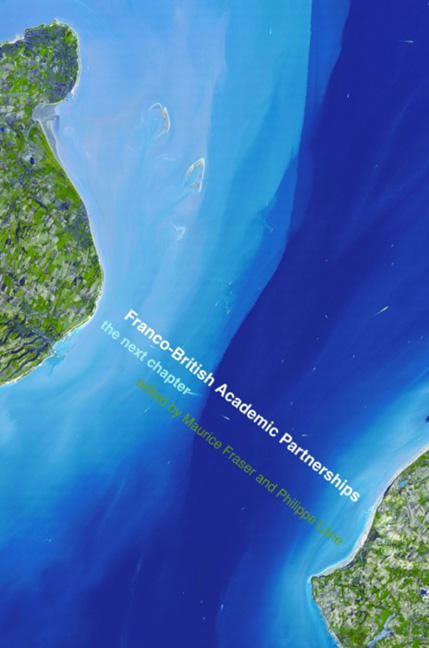Book contents
- Frontmatter
- Contents
- Notes on Contributors
- Foreword by His Excellency
- Foreword
- Preface
- Part I: Teaching and Training Partnerships
- Part II: Research Partnerships
- Part III: Broader Perspectives
- Appendices: Addresses and Speeches at the Franco-British Academic Partnerships Seminar, French Institute, London, 5 February 2010
- 1 David Willetts, Mp: Shadow Minister for Universities and Skills
- 2 Valérie Pécresse: Ministre de l'Enseignement Supérieur et de la Recherche
- 3 Rick Trainor: Principal, King's College London
- 4 Florentine Petit: Direction des Relations Européennes et Internationales et de la Coopération, Ministère de l'Enseignement Supérieur et de la Recherche
- 5 Brigitte Porée: The French Grandes Écoles and British Universities: Director of International Affairs, Conférence des Grandes Écoles
- 6 Monique Canto-Sperber: Director of the École Normale Supérieure, Paris
- 7 Sir Howard Davies: Franco-British University Collaboration – Can We Realise Churchill's 1940 Vision?: Director of the London School of Economics and Political Science
- 8 Adam Steinhouse: Academic–Government Partnerships – A Pragmatic View: Head of School of European Studies at the National School of Government
- 9 Hélène Duchêne: Directeur des Politiques de Mobilité et d'Attractivité, Direction de la Mondialisation, du Développement et des Partenariats, Ministère des Affaires Étrangères
- 10 Support for Higher Education from the French Embassy: Philippe Lane and Serge Plattard
- 11 Strengths and Opportunities in the British University System: Philippe Lane and Serge Plattard
4 - Florentine Petit: Direction des Relations Européennes et Internationales et de la Coopération, Ministère de l'Enseignement Supérieur et de la Recherche
from Appendices: Addresses and Speeches at the Franco-British Academic Partnerships Seminar, French Institute, London, 5 February 2010
- Frontmatter
- Contents
- Notes on Contributors
- Foreword by His Excellency
- Foreword
- Preface
- Part I: Teaching and Training Partnerships
- Part II: Research Partnerships
- Part III: Broader Perspectives
- Appendices: Addresses and Speeches at the Franco-British Academic Partnerships Seminar, French Institute, London, 5 February 2010
- 1 David Willetts, Mp: Shadow Minister for Universities and Skills
- 2 Valérie Pécresse: Ministre de l'Enseignement Supérieur et de la Recherche
- 3 Rick Trainor: Principal, King's College London
- 4 Florentine Petit: Direction des Relations Européennes et Internationales et de la Coopération, Ministère de l'Enseignement Supérieur et de la Recherche
- 5 Brigitte Porée: The French Grandes Écoles and British Universities: Director of International Affairs, Conférence des Grandes Écoles
- 6 Monique Canto-Sperber: Director of the École Normale Supérieure, Paris
- 7 Sir Howard Davies: Franco-British University Collaboration – Can We Realise Churchill's 1940 Vision?: Director of the London School of Economics and Political Science
- 8 Adam Steinhouse: Academic–Government Partnerships – A Pragmatic View: Head of School of European Studies at the National School of Government
- 9 Hélène Duchêne: Directeur des Politiques de Mobilité et d'Attractivité, Direction de la Mondialisation, du Développement et des Partenariats, Ministère des Affaires Étrangères
- 10 Support for Higher Education from the French Embassy: Philippe Lane and Serge Plattard
- 11 Strengths and Opportunities in the British University System: Philippe Lane and Serge Plattard
Summary
I am very pleased to participate, here in London, in this seminar as the representative of the French Ministry of Higher Education and Research (MHER), and to express our willingness to facilitate and enhance bilateral cooperation between France and the United Kingdom, especially within academic and scientific partnerships and through the greater mobility of students and researchers.
In these areas, our two countries maintain a long tradition of intensive and dynamic cooperation. The vast majority of our institutions have, in one form or another, collaborations established in all disciplines and have strong connections within the network, evidenced by the increase in recent years of double degrees, co-supervisions and theses, and the relatively stable student mobility.
France has a constant desire to develop the internationalisation of students’ curricula. This is a strong message from the Minister of Higher Education and Research, Mrs Valérie Pécresse. The students’ international mobility must become the rule in a training programme. Today, only 4 per cent of European students undertake part of their studies abroad and less than one institution in five in Europe offers an Erasmus programme to its students.
In 10 years, the proportion of foreign students in France has increased considerably, which is a success. Our country hosts 270,000 foreign students and 70,000 French students carry out a programme outside the national territory. Significantly increasing student mobility, especially in Europe, is a major concern for the MHER. France remains one of the top destinations in Europe for British students, with 2500 enrolled in our institutions. Against this indicator, we can compare the attractiveness of England, the first host of French students, with over 13,000 students.
Encouraging mobility requires actions on several aspects:
• motivation;
• environment;
• mobility;
• students’ language level;
• information;
• financial assistance.
That leaves room for improvement. But we also have to strengthen partnerships focused on conjoint training at master's level, leading to double degrees. These formations, opening up career opportunities or research, are a really interesting instrument for the promotion of student mobility and a factor of excellence of cooperation between institutions.
On this point, we want to maximise your experiences and enjoy your achievements, in order to identify both problems to be solved and best practices to model.
This seminar, on which all those who took the initiative have to be commended, is organised at the right time.
- Type
- Chapter
- Information
- Franco-British Academic PartnershipsThe Next Chapter, pp. 209 - 210Publisher: Liverpool University PressPrint publication year: 2011



